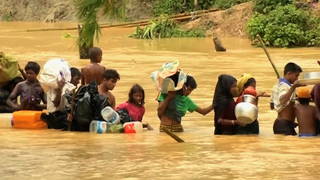
Topics
Pro-democracy leader Aung San Suu Kyi was freed today from 19 months of house arrest in Burma. She was greeted by thousands of cheering protesters.
Burma has been under military rule for forty years. The current group of generals came to power in 1988 after bloodily crushing a pro-democracy movement during which Suu Kyi came to prominence. The junta called general elections in 1990, but refused to hand over power after Suu Kyi’s party won a landslide victory. In 1991, Suu Kyi was awarded the Nobel Prize.
International sanctions have pushed the country’s economy to the brink of collapse. Since 1995, over 50 multinational corporations have cut ties with Burma, and the UN International Labor Organization recently increased pressure by exposing the pervasive use of forced labor throughout the country.
Suu Kyi says her party has not yet changed its support for economic sanctions.
Guest:
- Dr. Zar Ni, founder of the Free Burma Coalition. Zar Ni left Burma a month before an August 1988 massacre in which 5,000 to 10,000 people were killed by the Burmese military during peaceful demonstration.
Related link:











Media Options